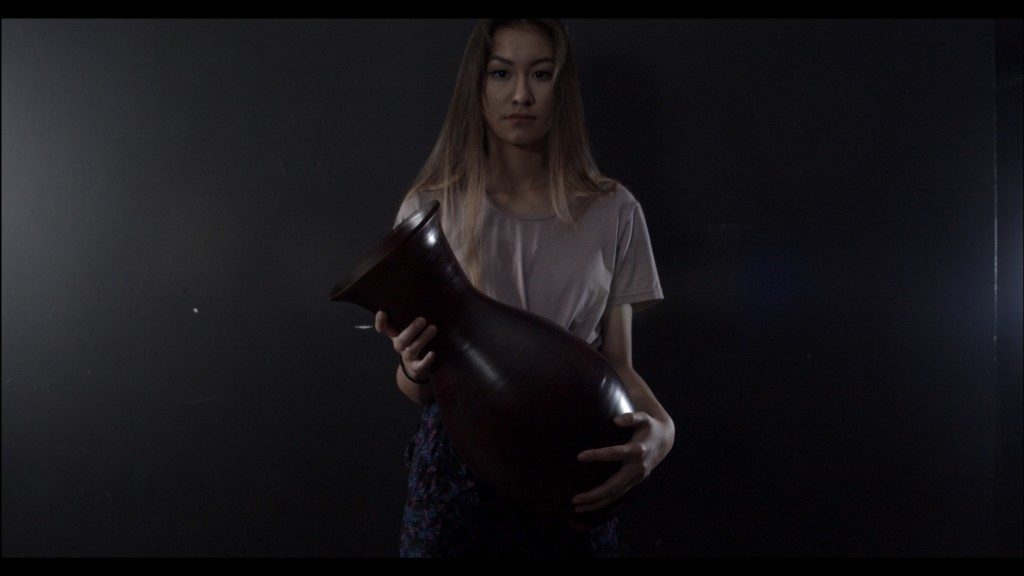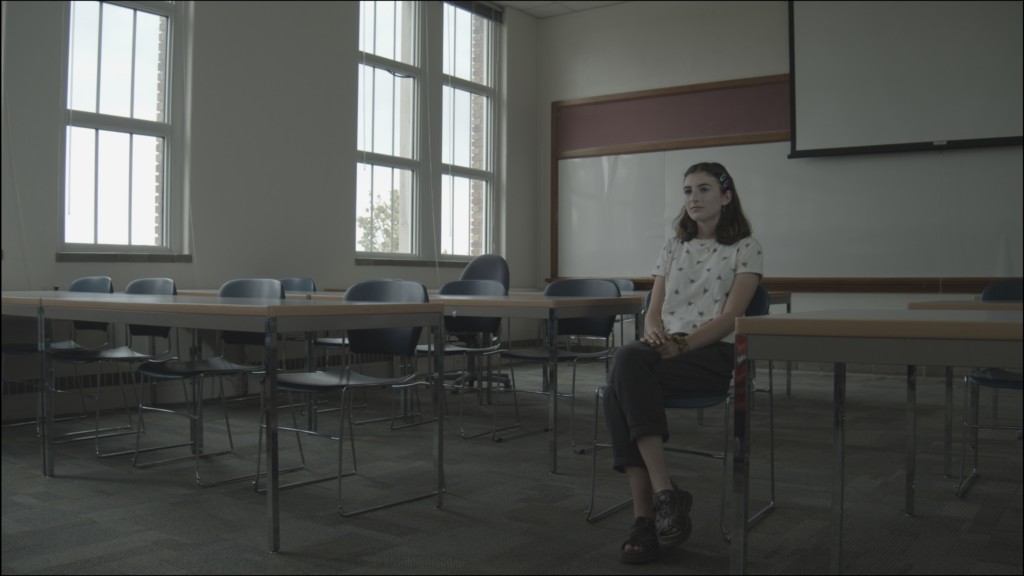The ambitious objectives for all the student film teams participating in this year’s 17th annual PitchNic project for Spy Hop Productions paid handsomely in a solid quartet of short films, all of which are worthy to submit to competitive film festivals nationally and even internationally. The films premiered Nov. 7 at a sold-out house in the Rose Wagner Center for Performing Arts.
Sown (Calvin Mumm, director; Taylor Kiser, producer, and Mike Eggert, cinematographer), a beautifully composed short documentary about how students’ lives have been affected by the incessant epidemic of school shootings, is one of PitchNic’s strongest ever in the nonfiction category. The short film, coming in at under 13 minutes, evokes the same urgent potency of inspiring youth expression that marked the 2005 short documentary Mother Superior, which was a PitchNic project about meth addiction.

The stark atmospherics of the shots in the classrooms and hallways, accompanied by a minimalist sound design, underscore the gravity of sobering emotions, concerns and opinions expressed by students. The briefest of news clips are interspersed as reinforcing markers but do not interrupt the flow of the student voices. For adults, it is a startling recognition of how these students’ formative years, since their earliest days in elementary grades, have been marked by news of shootings, lockdown drills and precautionary measures. It is jarring to hear high school students refer to Sandy Hook, which occurred seven years ago. Mentions of precautionary measures include clear backpacks and limited access for reentering the school should a student leave the grounds for lunch or an appointment in the middle of the day. Students bear the brunt of inconveniences while adults with the power to change the circumstances paralyze themselves by choice because of their selfish political and commercial interests.
The shots of long hallways and classroom windows and doors remind subtly of how vulnerable the risks can be for a tragic mass shooting at any school. Lockdowns go into effect at the slightest breach or sign that trouble is near or on site. Drills are not announced so students do not know until the end of the exercise that it was a practice run. There are no margins of error for second guessing.
Students frame their opinions in pragmatic, intelligent tones. They wonder why they shoulder the responsibilities for preventive measures while legislators and those with policy making powers refuse to consider the merits of gun control measures that at least would mitigate or dramatically reduce the rate of school violence. They also signal they will not be apathetic voters or citizens when they turn 18. The film makes clear one should be wary of underestimating the resolve of young people like those shown in Sown.

The title cards at the end of the film summarize local events that have occurred, emphasizing their disheartening frequency. Since the Columbine High School shootings in 1999, according to a report compiled by The Washington Post in 2018, more than 233,000 students in American schools were subjected to or threatened by similar events at 243 schools. The federal government does not track school shootings so the newspaper staff had to cobble the statistics from numerous sources. This year, there were 45 school shootings in the first 46 weeks of 2019.
The other short documentary was Marginalized (Citlaly Chavez, director and producer; Cade Langsdon, producer, Calvin Mumm, cinematographer, and Adriene Klein and Ruby Finlayson, editors), which examined the impact of idealistic perceptions of beauty that ignore those who look different or come from marginalized communities. For its representative example, the young filmmakers created a sensitive, artistic visual accompaniment to Sena Wright’s poem Everyday Beauty. The images and the music were synchronized effectively with the reading of the verses and the cadence of the visual work flowed with the poem’s structure and innate rhythm. The opening stanza was:
Everyday,
She longingly gazes into a mirror with hate,
At a face with stunningly colored lips,
Shaped by the world’s arches.
At a head with long chocolate colored hair,
Flowing as greatly as the Pacific Ocean.
With a complexity of alluring deep brown eyes,
Able to tell the story of a million words.
Marginalized sets a meritorious precedent as PitchNic’s first video art piece in the nonfiction genre. Its five-minute length will make it an appealing candidate for film festivals in and out of Utah.

The two teams producing short fiction narratives were equally ambitious. Backpacking Off Dreams (Cameron Baer, director and writer; Michael Eggert, producer and sound guy, and Adrienne Klein, cinematographer) has all of the right sensibilities one would expect from an intelligent, clever team of young 21st century filmmakers who adeptly contextualize the pop culture environment of their era. The story blends the familiar complications and illusions of perfect couple relationships with the escapist enticement of game avatars disembodied from the dream-crushing boredom of life’s routines. The main character, aptly named Reve, neatly anchors these elements.
This film also directs toward a new avenue in the PitchNic opus, as it features a good bit of animation, painstakingly produced by its director (Baer). Likewise, the music underscores The Legend of Zelda feel and the dynamic of trying to reach the next level in the fantastical dreamscape.
However, the student filmmakers also clarify that the game of relationships never will be nor should it ever be perfect. They dispel the notion of a perfect relationship, especially when it does not acknowledge that one person’s expectation of being perfect is really the other person’s source of misery. Reve feels trapped and the unexpected discovery of sketches from his pre-relationship days leads to exploring his own channel of reverie. The students handle most adeptly the challenge of not making one individual the good person and the other the antagonist. Reve’s stagnation cannot be resolved in current circumstances, even with the better intentions of his now-spurned partner.

The other fictional short, Friction (Ruby Finlayson, director and writer; Adrienne Klein, producer, and Burke Herold, cinematographer) does a commendable job on portraying contentious family relationships, as three siblings are tasked with going through the belongings of their mother who has died recently. A fourth character is the college-age daughter of one of the siblings who reluctantly but firmly takes on her mediating role, more for the benefit of her mother and in respect for her late grandmother.
The filmmakers framed the characters as several combatant nations from World War I and the metaphorical comparisons work well in this 13-minute storyline. The sibling with the daughter is trying her best to be as fair as possible with her brother and sister who are warring with each other. The brother appears to have relapsed into alcoholism. His sister bristles with resentment, the only one of the siblings who does not seem to be grieving for their mother’s passing.
It is evident in the story that the mother was difficult, as indicated by both sisters. Her death has done little to promote reconciliation. However, the brother appears to have had the closest relationship with his mother. The students do not have to stretch far to make the relationship tensions credible in the narrative. The scenes are realistic and the film delivers handsomely on the expectations of its title. Also notable is the music, which the director (Finlayson) wrote, recorded and performed on her violin.
In PitchNic’s history, more than 60 films have gone on to festivals or screenings in other venues, including museums, video exhibitions and juried awards. This latest quartet of films should add nicely to the program’s spectacular success rate. Kudos also go to the PitchNic mentors: José Manzo and Paige Sparks.
The films are available for screening at Spy Hop’s Vimeo page.

